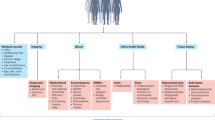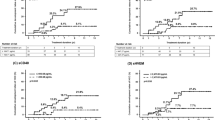Abstract
Background
The aims of this study were to identify clinically significant biomarkers of a response to atezolizumab plus bevacizumab (ATZ + BV) therapy and to develop target strategies against unresectable hepatocellular carcinoma (u-HCC).
Method
We first investigated the potential of circulating tumor DNA (ctDNA) to serve as a biomarker for predicting the therapeutic outcome in 24 u-HCC patients treated with ATZ + BV therapy. Next, we analyzed levels of immune-related cytokines in blood samples from 134 u-HCC patients who received ATZ + BV. For this, serum immune-related molecules or cancer-immune cycle-related molecules that have been reported in HCC patient sera, namely CD274, LAG-3, CCL2, 4, 5, CXCL1, 9, 10, 12, 13, CX3CL1, CCR5, IFNγ and IL-6, 8 were measured using enzyme-linked immunosorbent assay.
Results
More than 1% of variant read frequency (VRF) mutations were found in TP53, APC, PIK3CA and VHL, although with no correlation with treatment response. Among the 15 cytokines evaluated, CXCL9 and LAG-3 levels were significantly different between patients with objective response (OR), stable disease (SD), and progressive disease (PD) following ATZ + BV treatment. Receiver-operating characteristic curve analyses of CXCL9 (cut-off value: 419.1 pg/ml) and LAG-3 (cut-off value: 3736.3 pg/ml) indicated areas of 0.779 and 0.697, respectively, for differentiating PD from non-PD and OR from non-OR. In multivariate analysis of progression-free survival (PFS) and overall survival (OS), high serum CXCL9 (hazard ratio (HR) and 95% confidence interval (CI): 0.412 (0.251–0.677) (p = 0.0005) for PFS and 0.252 (0.125–0.508) (p = 0.0001) for OS), and low serum LAG-3 (HR and 95% CI 0.419 (0.249–0.705) (p = 0.0011) for PFS and 0.294 (0.140–0.617) (p = 0.0012) for OS) were independent positive predictive factors.
Conclusion
Although, as far as we examined, no ctDNA mutations in blood were found to be related to ATZ + BV treatment efficacy, serum CXCL9 and LAG-3 levels, which are related to the cancer-immune cycle, were associated with treatment efficacy and could be predictive markers of the efficacy of ATZ + BV treatment in HCC patients.




Similar content being viewed by others
Data availability
The data that support the findings of this study are available from the corresponding author upon reasonable request.
Abbreviations
- HCC:
-
Hepatocellular carcinoma
- u-HCC:
-
Unresectable HCC
- anti-PD-L1:
-
Anti-programmed death-ligand-1
- ICI:
-
Immune-checkpoint inhibitor
- RECIST:
-
Response evaluation criteria in solid tumors
- ATZ:
-
Atezolizumab
- BV:
-
Bevacizumab
- MTA:
-
Molecular targeted agent
- OR:
-
Objective response
- PR:
-
Partial response
- SD:
-
Stable disease
- PD:
-
Progressive disease
- AFP:
-
α-Fetoprotein
- BCLC:
-
Barcelona clinic liver cancer
- OS:
-
Overall survival
- PFS:
-
Progression-free survival
- CXCL9:
-
Chemokine (C-X-C motif) ligand 9
- LAG-3:
-
Lymphocyte-activation gene 3 (LAG-3)
References
Bray F, Ferlay J, Soerjomataram I, et al. Global cancer statistics 2018: GLOBOCAN estimates of incidence and mortality worldwide for 36 cancers in 185 countries. CA Cancer J Clin. 2018;68(6):394–424
European Association for the Study of the Liver. EASL Clinical Practice Guidelines: Management of hepatocellular carcinoma. J Hepatol. 2018;69(1):182–236
Finn RS, Qin S, Ikeda M, Galle PR, Ducreux M, Kim T-Y, et al. Atezolizumab plus bevacizumab in unresectable hepatocellular carcinoma. N Engl J Med. 2020;382(20):1894–1905
Kulkarni AV, Tevethia H, Kumar K, Premkumar M, Muttaiah MD, Hiraoka A, et al. Effectiveness and safety of atezolizumab-bevacizumab in patients with unresectable hepatocellular carcinoma: a systematic review and meta-analysis. EClinical Med. 2023. https://doi.org/10.1016/j.eclinm.2023.102179
Zhu AX, Abbas AR, de Galarreta MR, Guan Y, Lu S, Koeppen H, et al. Molecular correlates of clinical response and resistance to atezolizumab in combination with bevacizumab in advanced hepatocellular carcinoma. Nat Med. 2022;28(8):1599–1611
Myo** Y, Kodama T, Sakamori R, Maesaka K, Matsumae T, Sawai Y, et al. Interleukin-6 Is a circulating prognostic biomarker for hepatocellular carcinoma patients treated with combined immunotherapy. Cancers (Basel). 2022;14(4):883
Matsumae T, Kodama T, Myo** Y, Maesaka K, Sakamori R, Takuwa A, et al. Circulating cell-free dna profiling predicts the therapeutic outcome in advanced hepatocellular carcinoma patients treated with combination immunotherapy. Cancers (Basel). 2022;14(14):3367
Ogawa K, Kanzaki H, Chiba T, Ao J, Qiang N, Ma Y, et al. Effect of Atezolizumab plus bevacizumab in patients with hepatocellular carcinoma harboring CTNNB1 mutation in early clinical experience. J Cancer. 2022;13(8):2656–2661
Hosoda S, Suda G, Sho T, Ogawa K, Kimura M, Yang Z, et al. Low baseline CXCL9 predicts early progressive disease in unresectable HCC with atezolizumab plus bevacizumab treatment. Liver Cancer. 2022;12(2):156–170
Li Y, Porta-Pardo E, Tokheim C, Bailey MH, Yaron TM, Stathias V, et al. Pan-cancer proteogenomics connects oncogenic drivers to functional states. Cell. 2023;186(18):3291-3944.e25
Pinyol R, Sia D, Llovet JM. Immune exclusion-Wnt/CTNNB1 class predicts resistance to immunotherapies in HCC. Clin Cancer Res. 2019;25(7):2021–2023
Kingston B, Cutts RJ, Bye H, Beaney M, Walsh-Crestani G, Hrebien S, et al. Genomic profile of advanced breast cancer in circulating tumour DNA. Nat Commun. 2021;12(1):2423
Sangro B, Melero I, Wadhawan S, Finn RS, Abou-Alfa GK, Cheng AL, et al. Association of inflammatory biomarkers with clinical outcomes in nivolumab-treated patients with advanced hepatocellular carcinoma. J Hepatol. 2020;73(6):1460–1469
Chen DS, Mellman I. Oncology meets immunology: the cancer-immunity cycle. Immunity. 2013;39(1):1–10
Guo M, Qi F, Rao Q, Sun J, Du X, Qi Z, et al. Serum LAG-3 predicts outcome and treatment response in hepatocellular carcinoma patients with transarterial chemoembolization. Front Immunol. 2021;12: 754961
Sadeghi M, Lahdou I, Oweira H, Daniel V, Terness P, Schmidt J, et al. Serum levels of chemokines CCL4 and CCL5 in cirrhotic patients indicate the presence of hepatocellular carcinoma. Br J Cancer. 2015;113(5):756–762
Cui X, Li Z, Gao J, Gao PJ, Ni YB, Zhu JY. Elevated CXCL1 increases hepatocellular carcinoma aggressiveness and is inhibited by miRNA-200a. Oncotarget. 2016;7(40):65052–65066
Hayashi T, Yamashita T, Terashima T, Suda T, Okada H, Asahina Y, et al. Serum cytokine profiles predict survival benefits in patients with advanced hepatocellular carcinoma treated with sorafenib: a retrospective cohort study. BMC Cancer. 2017;17(1):870
Nahon P, Sutton A, Rufat P, Simon C, Trinchet JC, Gattegno L, et al. Chemokine system polymorphisms, survival and hepatocellular carcinoma occurrence in patients with hepatitis C virus-related cirrhosis. World J Gastroenterol. 2008;14(5):713–719
Duan Z, Gao J, Zhang L, Liang H, Huang X, Xu Q, et al. Phenotype and function of CXCR5+CD45RA-CD4+ T cells were altered in HBV-related hepatocellular carcinoma and elevated serum CXCL13 predicted better prognosis. Oncotarget. 2015;6(42):44239–44253
Tada T, Kumada T, Hiraoka A, Kariyama K, Tani J, Hirooka M, et al. Nutritional status is associated with prognosis in patients with advanced unresectable hepatocellular carcinoma treated with atezolizumab plus bevacizumab. Oncology. 2023;101(4):270–282
Sogbe M, Bilbao I, Marchese FP, Zazpe J, Vito A, Pozuelo M, et al. Prognostic value of ultra-low-pass whole-genome sequencing of circulating tumor DNA in hepatocellular carcinoma under systemic treatment. Clin Mol Hepatol. 2023. https://doi.org/10.3350/cmh.2023.0426
Litchfield K, Reading JL, Puttick C, Thakkar K, Abbosh C, Bentham R, et al. Meta-analysis of tumor- and T cell-intrinsic mechanisms of sensitization to checkpoint inhibition. Cell. 2021. https://doi.org/10.1016/j.cell.2021.01.002
Masuhiro K, Tamiya M, Fujimoto K, Koyama S, Naito Y, Osa A, et al. Bronchoalveolar lavage fluid reveals factors contributing to the efficacy of PD-1 blockade in lung cancer. JCI Insight. 2022;7(9): e157915
Anderson AC, Joller N, Kuchroo VK. Lag-3, Tim-3, and TIGIT: Co-inhibitory Receptors with Specialized Functions in Immune. Regulation Immunity. 2016;44(5):989–1004
Kisielow M, Kisielow J, Capoferri-Sollami G, Karjalainen K. Expression of lymphocyte activation gene 3 (LAG-3) on B cells is induced by T cells. Eur J Immunol. 2005;35(7):2081–2088
Aggarwal V, Workman CJ, Vignali DAA. LAG-3 as the third checkpoint inhibitor. Nat Immunol. 2023;24(9):1415–1422
Xu Y, Ding L, Li H, Peng Z, Ding K, Huang Z, et al. Serum cytokine analysis in a cohort of advanced non-small cell lung cancer treated with PD-1 inhibitors reveals predictive markers of CXCL12. Front Immunol. 2023;14:1194123. https://doi.org/10.3389/fimmu.2023.1194123
Wang X, Su W, Tang D, **g J, **ong J, Deng Y, et al. An immune-related gene prognostic index for triple-negative breast cancer integrates multiple aspects of tumor-immune microenvironment. Cancers. 2021;13(21):5342
Bai R, Lv Z, Xu D, Cui J. Predictive biomarkers for cancer immunotherapy with immune checkpoint inhibitors. Biomark Res. 2020. https://doi.org/10.1186/s40364-020-00209-0
Acknowledgements
The authors would like to thank all the patients and their families, as well as the investigators and staff at the participating institutions. Additional investigators are as follows: Ichiro Kawana, Satoshi Hishiki (Saiseikai Yokohamashi-Nanbu Hospital), Katsuaki Ogushi, Akihiro Funaoka (Yokohama City University Medical Center) and Katsuaki Tanaka (Hadano Red Cross Hospital).
Funding
This study was supported in part by a grant from JSPS KAKENHI (grant no. 21K07899).
Author information
Authors and Affiliations
Corresponding author
Ethics declarations
Conflict of interest
Makoto Chuma has received lecture fees from Chugai Pharmaceutical. Hidenori Toyoda has received lecture fees from Gilead Sciences Inc., AbbVie, Eisai Co., Ltd., Fujifilm WAKO, Terumo, Kowa and Takeda Pharmaceuticals. Atsushi Hiraoka has received lecture fees from Chugai Pharmaceutical, Eli Lilly Japan and Astra Zeneca Plc. Toshifumi Tada has received lecture fees from Chugai Pharmaceutical, AbbVie and Eisai Co., Ltd. Tatehiro Kagawa has received scholarship donations from Chugai Pharmaceutical and lecture fees from Chugai Pharmaceutical. The other authors have no conflicts of interest.
Additional information
Publisher's Note
Springer Nature remains neutral with regard to jurisdictional claims in published maps and institutional affiliations.
Supplementary Information
Below is the link to the electronic supplementary material.
12072_2024_10680_MOESM1_ESM.jpg
Supplementary file1 Flow chart of the study. ctDNA, circulating tumor DNA; HCC, hepatocellular carcinoma; ATZ+BV, atezolizumab plus bevacizumab; OR, objective response; PD, progressive disease (JPG 105 KB)
12072_2024_10680_MOESM2_ESM.jpg
Supplementary file2 Representative liver HCC lesions in arterial phase computed tomography images. Computed tomography (CT) image of a patient after atezolizumab + bevacizumab treatment for HCC at baseline (A), 8 weeks (B) and 32 weeks (C). Changes in the tumor markers α-fetoprotein (AFP) and des-γ-carboxy prothrombin (DCP) between baseline and after ATZ+BV treatment (A-C). (JPG 144 KB)
Rights and permissions
Springer Nature or its licensor (e.g. a society or other partner) holds exclusive rights to this article under a publishing agreement with the author(s) or other rightsholder(s); author self-archiving of the accepted manuscript version of this article is solely governed by the terms of such publishing agreement and applicable law.
About this article
Cite this article
Chuma, M., Uojima, H., Toyoda, H. et al. Clinical significance of circulating biomarkers of immune-checkpoint molecules with atezolizumab plus bevacizumab therapy in unresectable hepatocellular carcinoma. Hepatol Int (2024). https://doi.org/10.1007/s12072-024-10680-8
Received:
Accepted:
Published:
DOI: https://doi.org/10.1007/s12072-024-10680-8




